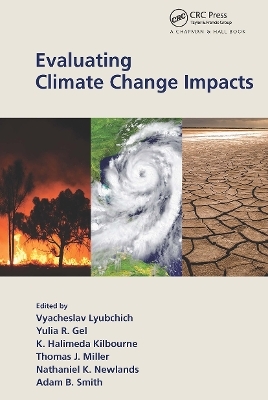
Evaluating Climate Change Impacts
Chapman & Hall/CRC (Verlag)
978-0-367-55213-8 (ISBN)
- Titel z.Zt. nicht lieferbar
- Versandkostenfrei
- Auch auf Rechnung
- Artikel merken
Evaluating Climate Change Impacts discusses assessing and quantifying climate change and its impacts from a multi-faceted perspective of ecosystem, social, and infrastructure resilience, given through a lens of statistics and data science. It provides a multi-disciplinary view on the implications of climate variability and shows how the new data science paradigm can help us to mitigate climate-induced risk and to enhance climate adaptation strategies.
This book consists of chapters solicited from leading topical experts and presents their perspectives on climate change effects in two general areas: natural ecosystems and socio-economic impacts. The chapters unveil topics of atmospheric circulation, climate modeling, and long-term prediction; approach the problems of increasing frequency of extreme events, sea level rise, and forest fires, as well as economic losses, analysis of climate impacts for insurance, agriculture, fisheries, and electric and transport infrastructures. The reader will be exposed to the current research using a variety of methods from physical modeling, statistics, and machine learning, including the global circulation models (GCM) and ocean models, statistical generalized additive models (GAM) and generalized linear models (GLM), state space and graphical models, causality networks, Bayesian ensembles, a variety of index methods and statistical tests, and machine learning methods. The reader will learn about data from various sources, including GCM and ocean model outputs, satellite observations, and data collected by different agencies and research units. Many of the chapters provide references to open source software R and Python code that are available for implementing the methods.
The book is an interdisciplinary initiative of statisticians, climatologists, ecologists and oceanographers whose research addresses development and implementation of analytical methodology for assessing climate change impacts. The team includes statisticians V. Lyubchich and Y. R. Gel (statistical and machine learning methods for quantification of the climate-induced risk), climatologist K. H. Kilbourne (paleoclimatology, geochemistry, assessment of the causes of climate variability), fisheries scientist T. J. Miller (effects of ocean acidification on blue crab, recruitment issues in menhaden and striped bass), disaster expert A. B. Smith (analysis of economic and societal impacts of extreme events and natural hazards), and research scientist in food-water-energy nexus N. K. Newlands (sustainability, precision agriculture and risk analysis using machine learning and integrated modeling).
1. On Evaluation of Climate Models 2. A Statistical Analysis of North Atlantic Tropical Cyclone Changes 3. Fire Weather Index and Climate Change 4. Probabilistic Projections of High Tide Flooding for the State of Maryland in the st Century 5. Response of Benthic Biodiversity to Climate-Sensitive Regional and Local Conditions in a Complex Estuarine System 6. Using Structural Comparisons to Measure the Behavior of Complex Systems 7. Causality Analysis of Climate and Ecosystem Time Series 8. Statistical Issues in Detection of Trends in Losses from Extreme Weather and Climate Events 9. Event Attribution: Linking Specific Extreme Events to Human-Caused Climate Change 10. Financing Weather and Climate Risks in the United States 11. Extreme Events, Population, and Risk: an Integrated Modeling Approach 12. Aspects of Climate-Induced Risk in Property Insurance 13. Climate Change Impacts on the Nation’s Electricity Sector 14. Impacts of InclementWeather on Traffic Accidents in Mexico City 15. Statistical Modeling of Dynamic Greenhouse Gas Emissions 16. Agricultural Climate Risk Management and Global Food Security: Recent Progress in South-East Asia 17. Poppy Cultivation and Eradication in Mexico : the Effects of Climate
| Erscheinungsdatum | 28.09.2023 |
|---|---|
| Reihe/Serie | Chapman & Hall/CRC Applied Environmental Statistics |
| Sprache | englisch |
| Maße | 156 x 234 mm |
| Gewicht | 740 g |
| Themenwelt | Medizin / Pharmazie ► Medizinische Fachgebiete ► Arbeits- / Sozial- / Umweltmedizin |
| Naturwissenschaften ► Biologie ► Ökologie / Naturschutz | |
| Naturwissenschaften ► Geowissenschaften ► Geologie | |
| Naturwissenschaften ► Geowissenschaften ► Geophysik | |
| Technik ► Umwelttechnik / Biotechnologie | |
| ISBN-10 | 0-367-55213-2 / 0367552132 |
| ISBN-13 | 978-0-367-55213-8 / 9780367552138 |
| Zustand | Neuware |
| Informationen gemäß Produktsicherheitsverordnung (GPSR) | |
| Haben Sie eine Frage zum Produkt? |
aus dem Bereich


